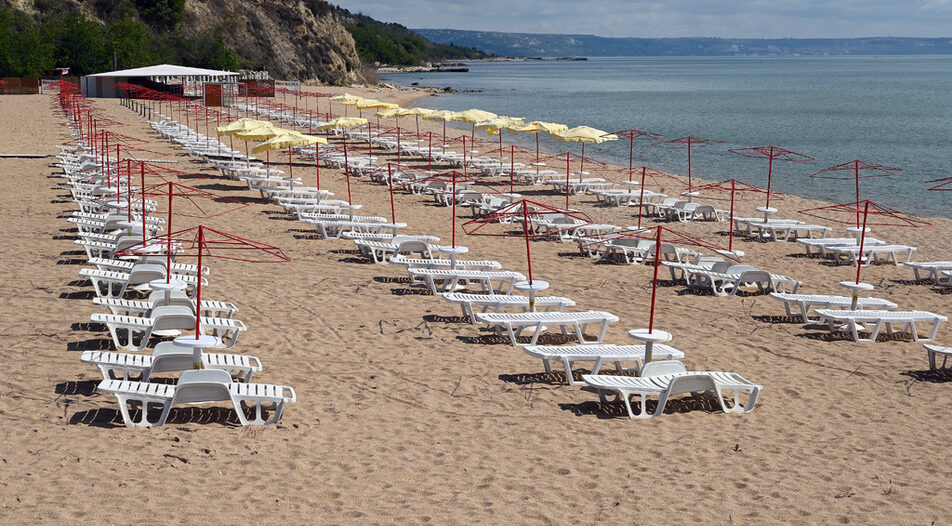This summer, the tourism industry in Bulgaria is facing a second year of half-empty hotels. Some optimism comes from the coastal airports in Varna and Burgas, which hope to reach 70% of the arrivals in 2019. But that is just a snapshot, which should be viewed as conditional, as experience shows that bookings quickly ebb and tide with the pandemic waves. Besides, hotel managers and tour operators are quite reserved, with the bravest forecasts showing that the 2021 summer season will reach a level twice last year's, when the seaside resorts registered a catastrophic drop in arrivals of some 70%.
In brief, this year the industry will struggle to minimize the damage from the corona crisis. The stakes are high: in normal conditions the sector generates more than 9 billion levs (4.6 billion euro) in revenue and together with the related transport and restaurant services secures 12% of Bulgaria's gross domestic product.
Delayed start
Although Bulgaria introduced one of the most liberal conditions for entry, opening green corridors without PCR tests for vaccinated people and former Covid-19 patients, that has not produced an immediate effect. The charter flight programs from Russia were cancelled until the end of May and those from Germany, which is Bulgaria's biggest tourist market, were put off until June 30.
There are several factors for this: Bulgaria is not yet listed among the safest destinations and tourists this summer prefer visiting islands, which this country cannot offer. That is coupled with still existing restrictions for trips abroad in major markets for Bulgarian tourism. Besides, vaccination is proceeding more slowly than expected in many countries. The lists of safe and risky states are very dynamic, which destines the summer season of 2021 to insecurity, with reservations pending until the very last moment.
Airports of hope
The expectations of the airports in the seaside cities of Varna and Burgas are more than positive. A total of 23,500 flights are planned for May-October, which concessionaire Fraport says amounts to some 70% of the flight program in 2019. The expected number of visitors is nearly 4 million, compared to more than 5 million arriving at the two airports before the crisis. But the projection is much higher than last year's number of just a touch above 1 million arriving tourists.
The top foreign destinations with the most flights planned to Varna are Germany, Poland, Turkey and the United Kingdom; Burgas expects flights from the Czech Republic, Germany, Poland, Russia and the United Kingdom.
It should be noted though that the airport data are uncertain and can easily change. The airports themselves admit the situation is very dynamic.
Last-minute tourists
It is clear that foreign tourists will not be numerous: in the worst-case scenario they will be at last year's level but the average expectations are that their number will reach 50 or 60% of the typical level in a strong year.
Crucial for the German market will be Bulgaria's removal from the list of risky destinations. It will also depend on tour operators' success to collect good last-minute reservations. Kalin Sutev, manager of Destination Touristik Services, which represents DER Touristik in Bulgaria, says the company hopes to achieve at least last year's levels. But Lachezar Todorov, manager of Terra Tour Service with hotels in Slanchev Bryag and Obzor, projects twice the 2020 results.
However, nothing is certain. "The reservations we have on our screens from tour operators and individual tourists are not pre-paid and can be cancelled at any time," says Elena Ivanova, owner of the Imperial hotel in Slanchev Bryag.
This summer, the tourism industry in Bulgaria is facing a second year of half-empty hotels. Some optimism comes from the coastal airports in Varna and Burgas, which hope to reach 70% of the arrivals in 2019. But that is just a snapshot, which should be viewed as conditional, as experience shows that bookings quickly ebb and tide with the pandemic waves. Besides, hotel managers and tour operators are quite reserved, with the bravest forecasts showing that the 2021 summer season will reach a level twice last year's, when the seaside resorts registered a catastrophic drop in arrivals of some 70%.
In brief, this year the industry will struggle to minimize the damage from the corona crisis. The stakes are high: in normal conditions the sector generates more than 9 billion levs (4.6 billion euro) in revenue and together with the related transport and restaurant services secures 12% of Bulgaria's gross domestic product.












